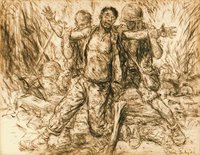 One of the wounds that soldiers in the field often suffer is something that modern psychiatrists call Post Traumatic Stress Disorder. In earlier days, it used to be called "shell shock." In his recent statements on the Iraq War, Rep. John Murtha commented on the many vets now in the hospitals suffering from this psychological disease.
One of the wounds that soldiers in the field often suffer is something that modern psychiatrists call Post Traumatic Stress Disorder. In earlier days, it used to be called "shell shock." In his recent statements on the Iraq War, Rep. John Murtha commented on the many vets now in the hospitals suffering from this psychological disease.
Often, those in the military have downplayed the effects of this condition. Many times, soldiers have been accused of being cowards because they were suffering hallucinations, uncontrollable tics and inability to think straight. The effects, however, do not simply go away after vets come home. These effects can last for many many years, often resulting in nightmares, auditory and visual hallucinations, and paranoia.
Murtha noted that there will probably be over 50,000 vets who will sufer from this condition after the Iraq War is done. As was hte case in Viet Nam, many of these vets will end up on the streets, homeless. (Indeed, it has been estimated that a majority of the homeless are former Viet Name Vets.)
A recent article in the "Denton [Texas] Record-Chronicle" reports on soldiers who are already coming back and trying to become "normal" again. According to the young wife of a vet, whose husband died:"Michael wasn't in Iraq, but in his mind, he was there day in and day out," said his widow, Stefanie Pelkey of Spring, Texas. "He'd never discuss the details of his experiences in Iraq, but they changed him forever. What killed my husband was a wound of war."
Many thinkers have investigated the effects of war on peoples' lives. For the leaders of his ideal city, Plato wanted them to be exposed from earliest childhood to the horrors and viccissitudes of war. The poet Homer's hero, Odysseus, battles demons, gods, and natural disasters before he returned home--symbols, no doubt, of the many demons that former soldiers of all ages face in their everyday lives and dreams.
Sunday, December 04, 2005
Shell Shock, aka PTSD
Subscribe to:
Post Comments (Atom)






No comments:
Post a Comment